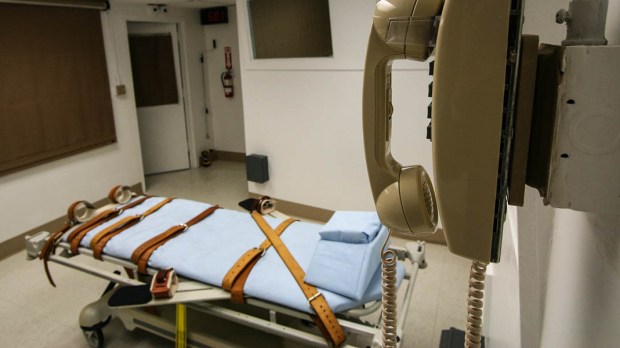The Supreme Court of the State of Washington overturned the death penalty on Thursday, October 11, because it was implemented in an arbitrary and racially biased way. According to the court, the maximum penalty violates the state constitution.
“The death penalty, as administered in our state, fails to serve any legitimate penological goal; thus, it violates article I, section 14 of our state constitution,” wrote Chief Justice of the Supreme State Court Mary Fairhurst in her statement, cited by the Seattle Times.
In their ruling, the state’s Supreme Court justices also gave the order to turn the death penalty into life imprisonment for the eight persons currently still imprisoned on death row.
With this ruling, Washington becomes the 20th state of the nation not to have the death penalty. The decision was praised by King County Prosecutor Dan Satterberg.
In some cases—explained the representative of the prosecution—the judicial process went on for more than 20 years. In addition to the enormous cost, death sentences are often overturned and do not contribute to public security, added Satterberg.
Moratorium
Moreover, a moratorium was declared in the state in 2014, decided by Governor Jay Inslee, a Democrat. In a recent poll conducted by Public Policy Polling, more than two thirds, or 69 percent, of those interviewed in the state had declared themselves in favor of life imprisonment for those who committed a murder, instead of the death penalty.
Since 1993, five death sentences have been carried out in the state of Washington, and the last execution took place in 2010. As the Seattle Times recalled, in all cases the condemned were men. Two were executed by hanging and three by lethal injection. A woman has never been put to death in the state of Washington.
“The death penalty is becoming an anachronism nationally, in part because society has evolved, matured and better understands that it’s a flawed system of punishment,” reads an editorial of the Seattle Times, which also speaks of a “proud day” for the state and recalls that 19 other states already had preceded the state of Washington in abolishing the death penalty.
Abolished in 20 US States
As mentioned above, in almost half of the 50 states of the Union, i.e. 20, the death penalty has been abolished or declared unconstitutional. Besides the State of Washington, these are the following (in chronological order): Michigan (1846), Wisconsin (1853), Maine (1887), Minnesota (1911), Alaska (1957), Hawaii (1957), Vermont (1964) ), Iowa (1965), West Virginia (1965), North Dakota (1973), Massachusetts (1984), Rhode Island (1984), New Jersey (2007), New York (2007), New Mexico (2009), Illinois ( 2011), Connecticut (2012), Maryland (2013) and Delaware (2016).

Read more:
The death penalty in the U.S.: What you need to know
While in Vermont the abolition is not total, in the sense that it remains in force for those guilty of high treason, in some states the abolition of capital punishment dates back even to the 19th century, such as in the cases of Michigan and Wisconsin, where it was struck down before the American Civil War (1861-1865), in 1846 and 1853 respectively.
In four other states there is a moratorium on the execution of the death penalty: in Oregon (since November 22, 2011, with view to abolition), Colorado (since May 22, 2013), Pennsylvania (since February 23, 2015) and finally in the most populous of all the US states, California (since July 17, 2014). In other large states, however, such as Florida and Texas, the death penalty has remained.
Supreme Court of the United States
Even the Supreme Court of the United States has been dealing with the death penalty recently, in two cases in particular, notes the Catholic News Service website (October 11). The first comes from a specific case in Alabama, concerning the legitimacy of executing a prisoner suffering from dementia if he no longer remembers the crime for which he was sentenced to death.
The second is based on the case of a detainee imprisoned on death row in the state of Missouri. This prisoner suffers from a rare medical condition that could cause him severe pain if he were to be executed by lethal injection. The question is whether he can be put to death by a less painful method because of his medical condition, for example through the use of gas.
According to Krisanne Vaillancourt Murphy, executive director of the Catholic Mobilizing Network, the two cases—respectively Madison v. Alabama and Bucklew v. Precythe—“put the unworkability and inhumanity of capital punishment on full display.”
As noted by Judge Stephen Breyer, a member of the Supreme Court since 1994, due to the aging of the condemned who await their execution—in some cases 20 to 40 years—this is a problem destined to become “increasingly common.”
The 8th Amendment of the US Constitution prohibits inflicting “cruel and unusual punishment,” and the same Supreme Court ruled in 2003 that the execution of people with mental retardation should be considered a violation of the 8th Amendment, recalls the CNS.
Malaysia towards abolition
Even in Malaysia, capital punishment’s days are numbered, at least if the parliament of the Southeast Asian country approves the initiative promoted by the government of Prime Minister Mahathir Mohamad, elected last May. Justice Minister, Liew Vui Keong, announced the move on October 10.
The news was confirmed on October 11 by the Minister of Communications, Gobind Singh Deo. “This is part of our electoral promise and is also in line with the departure from the death penalty in the rest of the world,” he said.
According to Fides (published in Italian), about 1,267 inmates await execution on Malaysia’s death row, which is 2.7 percent of the country’s entire prison population of 60,000 people. “Our opinion is that the death sentences already imposed should not be executed. We support the possibility of commuting their sentences,” said Catholic activist Hector Fernandez, a member of the Non-Governmental Organization: Malaysians Against Death Penalty and Torture (MADPET).
The NGO expressed the hope that the deputies and senators of the opposition parties in the Putrajaya Parliament (as the new federal administrative district of the country is called) “will fully support the just move to abolish the death penalty,” reads a statement published on their website.
Bangladesh: The death penalty as a weapon in the fight against drugs
The question of the death penalty in Bangladesh is very different, where the government of Prime Minister Sheikh Hasina approved a bill on October 8, which provides for the application of capital punishment as a weapon in the fight against drugs.
The amendment to the Narcotics Control Act of 1990 defines for the first time the tablets of yaba (a synthetic substance based on methamphetamine) as a drug and then proposes the death penalty as the maximum sentence for “producing, smuggling, distributing and using more than 5 grams of ‘yaba,’” explained the cabinet secretary, Mohammad Shafiul Alam.
“Tougher punishment [is] needed to curb the spread of yaba, a highly potent stimulant smuggled in from neighboring Myanmar,” says Alam. But according to critics the move, only expresses the authoritarian leanings of the politician in view of the upcoming elections.
There is fear of a war against drugs similar to the one that President Rodrigo Duterte is carrying out in the Philippines, characterized by a very high number of extrajudicial killings. Since the middle of May, Bangladeshi security forces have killed over 200 people. According to the Odhikar human rights group, in more than a third of the cases the suspects were securely arrested before being killed.
World Day against the Death Penalty
On the occasion of the World Day against the Death Penalty, celebrated every year on October 10, the Secretary-General of the United Nations, the Portuguese Antonio Guterres, recalled that currently in about 170 countries of the world capital punishment has been abolished or there has at least been a moratorium introduced on executions.
Even in eastern Europe there are still executions. Belarus is the only country on the continent to maintain capital punishment, and for now it does not intend to take steps towards abolition, said the permanent representative of the government of Minsk at the UN Human Rights Committee in Geneva, Jurij Ambrazevic, reports the Italian website, RaiNews. More than 400 death sentences for shootings have been carried out over the last two decades in the country, the site notes.
According to the latest Amnesty International report, presented last April, at least 993 people—or 39 fewer than in 2016—were executed worldwide, but this is only a minimum estimate because there is no data relating to countries like China, where the number of executions is in fact a “state secret.”
Excluding China, 84 percent of all documented executions were carried out in only four countries of the globe: Iran (at least 507, of which at least 5 were minors at the time of the crime), Saudi Arabia (146), Iraq (at least 125) and Pakistan (at least 60).

